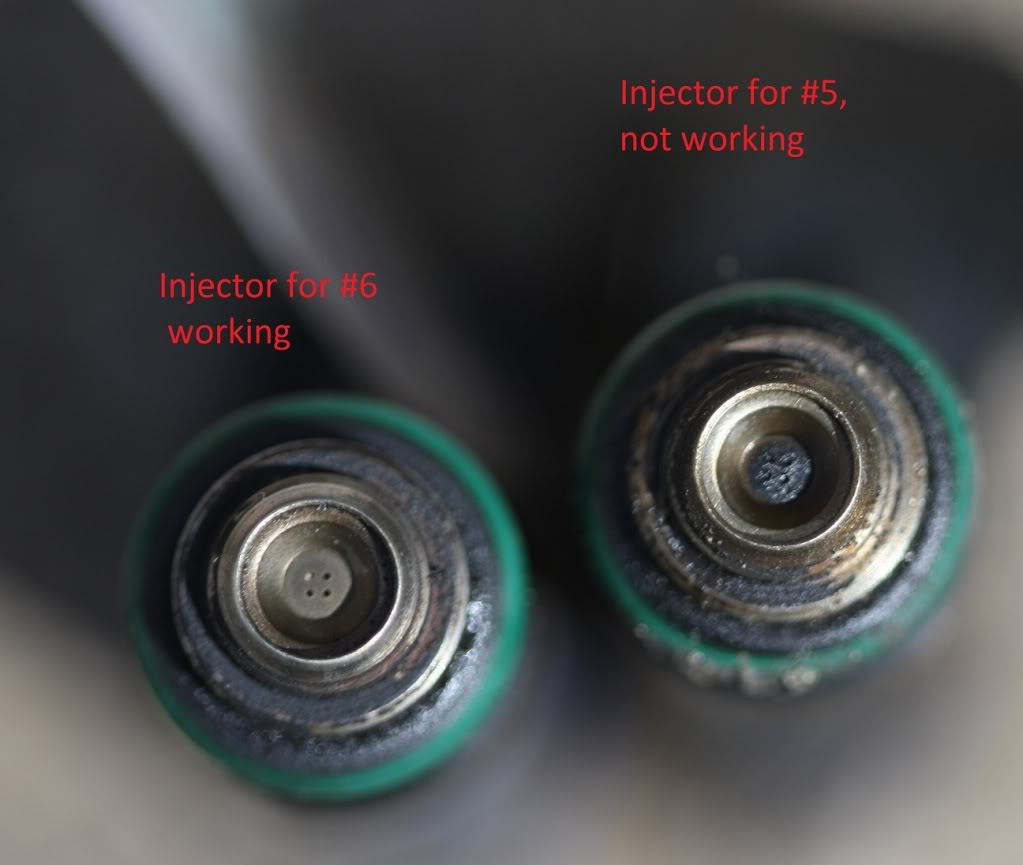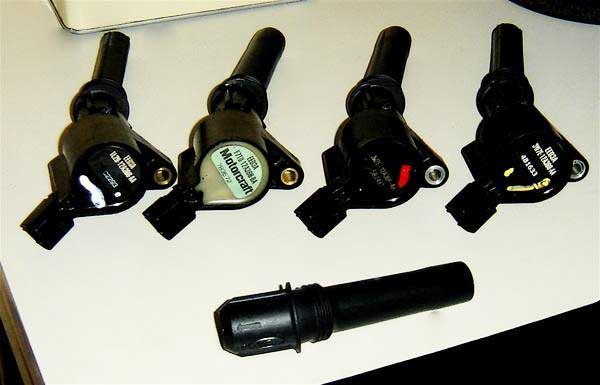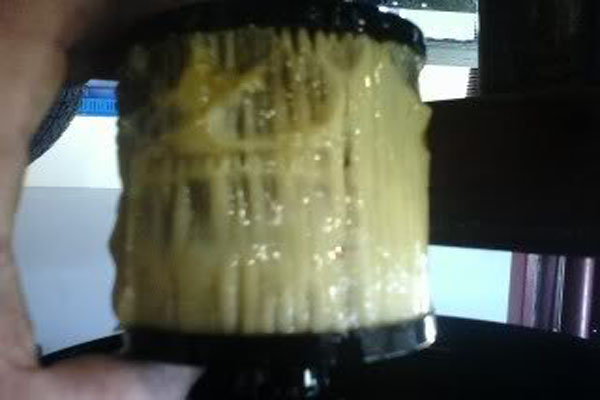Find the cause of your F-150’s power loss with our diagnostic guide.
By Mark Kovalsky — November 19, 2014
Tento článek se vztahuje na Ford F-150 (2004-2014).
An engine needs four things in order to make power: air, the proper amount of fuel, compression, and a means of igniting the compressed fuel/air mixture. Any F-150 or F-250 that has lost power is deficient in one of those four things. This makes discovering the underlying cause of low power output a relatively logical process. This diagnostic will walk you through the major common causes of weak engine performance in the gasoline and diesel F-150 and F-250 models.
Step 1 — Is the air filter dirty?
If the air filter is so dirty that it restricts airflow to a large degree, the computer controls won’t be able to compensate for this, and the air/fuel ratio will be too rich to operate properly. Alternatively, if there is an air leak beyond where the airflow is measured, the air/fuel ratio will be too lean. Either condition can cause a loss of power, or even a misfire.
(Related Article: How to Replace Air Filter — Ford-Trucks.com)

Step 2 — Is the fuel filter clogged?
If the fuel filter is plugged, the air/fuel ratio can be too lean. This will cause a loss of power or a misfire. If the fuel pressure regulator were to fail, the air/fuel ratio can be either too rich or too lean, depending on the failure.
(Related Article: How to Replace Fuel Filter — Ford-Trucks.com)
Step 3 — Are the injectors dirty?
Another potential cause of a loss of power is dirty injectors. Residue from fuel combined with heat from the engine can cause deposits on the injectors, which causes several problems. The deposits can block the fuel flow so that the engine doesn’t get the proper amount of fuel. Deposits can also interfere with the atomization of fuel. If the fuel isn’t atomized it will either burn too slow, or not burn at all. Obviously, this will cause a loss of power.

Step 4 — Are the spark plugs worn?
Worn or defective spark plugs can prevent a good spark so that the air/fuel mixture doesn’t burn at all. So can deposits on spark plugs. Spark plugs are a wear item and must be replaced according to the manufacturer’s schedule to maintain engine performance.
(Related Article: How to Replace Spark Plugs — Ford-Trucks.com)

Step 5 — Are the ignition coils failing?
A weak or failed ignition coil is another potential source of a loss of engine power. Ford Modular engines are well known to have issues with the coil on plug systems. Coils get weak with age and misfire under load. This is often misdiagnosed as torque converter shudder. It is easiest to detect under load at about 45-50 MPH with the torque converter locked. The weak coils show themselves as random jerks in this condition.
Most of the time, a bad coil will cause the truck’s computer to store a diagnostic trouble code. Connecting an OBD-II scanner to the truck and checking for codes is a good preliminary step. A misfiring truck likely has a diagnostic code stored that identifies which cylinder is misfiring.
Typically, the coils tend to fail at relatively the same time. The best fix is to replace all of the coils at once. The less expensive, more complicated route is to isolate the bad one(s) and replace them individually as they go out.

Step 6 — Is the engine mis-timed?
Engine timing that is out of step could be another possibility, but with modern engines this is rarely the cause. Timing is no longer adjustable like it used to be, so if the timing is wrong it is because something major has happened, such as the timing chain has jumped a tooth. This will be apparent as the engine always is very low on power. It probably will have problems accelerating altogether.
Featured Video: Why is My Ford Truck Losing Power?
Související diskuze a weby
- Ford Dirty Fuel Injector — Bobistheoilguy.com
- How Long WIll Spark Plugs Last in a 4.6 Liter F-150? — F150online.com
- How Hard is it to Change Spark Plugs? — F150online.com
- Problem with Dirty, Oily Air Intake On Ford Diesel Super Duty — Ford-Trucks.com
- K&N Air Filter for Ecoboost — Ford-Trucks.com
- How to Test Ignition Coils on Ford F-150 — Ford-Trucks.com


On the road, the last thing you want to encounter is a lack of power when you try to accelerate. In a Ford F-150, this lack of strength can even be dangerous. It can be confusing and scary for this massive vehicle to fail on you like this on the road. Why is there no power to your Ford F-150 when accelerating?
If you’re interested in understanding why your car has failed you, we have five reasons. Read on to learn more about why your Ford F-150 jerks when you accelerate and why there is no power to your Ford F-150. The more you know, the better prepared you can be. There’s a lot to cover, so let’s get started.
Why Does My Ford F-150 Jerk When I Accelerate?
Maybe your car isn’t severely lacking power, it just jerks while it accelerates. This trouble can be confusing, too. Why does your Ford F-150 jerk when you accelerate? Is it a cause for concern?
Here are five reasons an F150 may be jerking:
- Špinavé vstřikovače paliva
- Blokování
- Opotřebované zapalovací svíčky
- Znečištěné vzduchové filtry
- Damaged cylinders
These can be fixed by a professional.
If you experience jerking on the road and don’t know what to do, seek a professional. This person will help you diagnose the trouble before it gets worse.
Top Five Reasons for Lack of Power in an F150
Now, let’s discuss the lack of power in your Ford F-150. Many errors could serve as the cause of your power issue with the truck. If you suspect one of these, ensure you take your vehicle to a professional for the best results as soon as possible.
Here are five of the top reasons for minimal power:
- Catalytic converter clog
- Clutch faults
- Problémy s přenosem
- Bad Torque Converters
- Prokluzování ozubeného kola
These can deplete your power in no time.
Let’s dive further into each trouble to help you determine what’s wrong with your Ford F-150. In no time at all, you can hit the road with just as much power as you have before. A professional can help you make necessary fixes.
Catalytic Converter Clog F150
A clogged catalytic converter could be the cause of your lack of power. There could be a defect in the system that has caused faults to your mechanical system rather than helping everything move forward.
Here are a few symptoms of a clogged catalytic converter:
- Snížené zrychlení
- Exhaust smoke that is darker than usual
- Vůně síry
- Excessive engine heating
- Sluggish functions
Seek help as soon as possible if you notice these.
If you aren’t sure what’s wrong, seek someone who knows the Ford F-150. They will be able to guide you in the right direction.
Clutch Faults in an F150
The clutch can cause a lot of trouble when it comes to a lack of power when accelerating. One of the most common clutch troubles is incorrect alignment, which can prevent the system from accelerating to the proper point on the road.
Here are a few symptoms of a clutch failure:
- Skřípavé zvuky
- Pálení vůně
- Prokluzování spojky
- Stuck pedal
Seek help if you notice any of these symptoms.
It can be tricky to determine if a clutch is at fault if your Ford F-150 won’t accelerate with power on the road. If you’re unsure, you should bring your vehicle to a professional to ensure the part gets taken care of in a mechanical setting.
Transmission Issues on an F150
A transmission runs all the time, so troubles could occur in this area. The engine and transmission may wear out, whether to age or natural factors on the road. The result is a lack of power on the road as you accelerate.
Here are a few symptoms of transmission issues:
- Degraded fluid level
- Burning scent
- Pomalý výkon
- Weird engine noises
- Grinding and shaking
These will pair with no power when accelerating.
A professional can help you address transmission faults as soon as possible. It may be expensive to fix, but the price point is worth it.
Bad Torque Converters on an F150
A torque converter is a fluid coupling that transfers power from one source to another. If it fails, it can’t hold the necessary ATF. Thanks to this fault, there is a lag in the transmission and a lack of power in the system.
Here are a few symptoms of poor torque converters:
- Overheating system
- Shuddering car
- Damaged torque seal
- Znečištěná převodová kapalina
Address these as soon as possible.
If you notice symptoms and a lack of power, ensure you take your Ford to a professional as soon as possible. They can help you address the troubles before other damage happens inside the system.
Prokluzování ozubeného kola
If your car runs low on transmission fluid, it could cause the gears to slip. When the gear falls, the Ford F-150 can struggle to produce the energy necessary to accelerate on the road. It’s critical to address this trouble as soon as possible to avoid further damage.
Here are a few symptoms of gear slippage in a Ford F-150:
- Pálení vůně
- Netěsnost převodovky
- Prokluzující ozubená kola
- Křupavý hluk
Act if you notice this and have no power.
More transmission fluid or a fixed leak may be necessary to handle gear slippage. A professional can guide you if you think gear slippage may be the case with your Ford F-150.
Proč investovat do čističky vzduchu?
If your Ford F-150 has no power when accelerating, there is no need to fear. Many common issues can cause this to happen. Catalytic converter clogs, clutch faults, transmission issues, bad torque converters, and gear slippage are all causes of the power lack.
We hope this information was helpful! If you love your Ford F-150, you don’t want it to fall apart due to a tiny issue. The more you know about the Ford F-150 and the potential causes of a lack of power, the better prepared you will be if trouble surfaces in your life. You can take care of it as soon as possible.


















